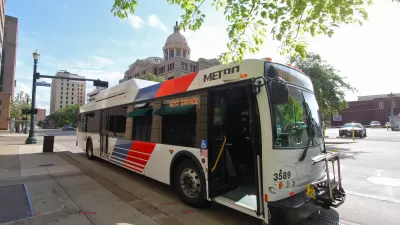Houston is making big transportation news this week with the launch of a newly replanned Metropolitan Transit Authority (Metro) bus system.
Here's a look around a variety of media outlets for a sample of the coverage on the first days of Metro's new bus system in Houston, which makes use of a high frequency grid and did not require a new source of transit funding.
Jarrett Walker provides insight, as the consultant that led the design process of the new system, into what the new system means for residents of Houston. Walker also shares a lot more links to local coverage of the system overhaul. His message: "Welcome, Houston, to a totally new transit system. And for everyone else, remember: If your bus network is obsolete, you can reimagine it to be more liberating and useful, and also to be more relevant to building the city you want."
Gail Delaughter previewed the launch of the new system a few days before it went live on August 16, 2015—focusing on Metro's customer service and outreach efforts. The roll out of the new system includes free rides from August 16-22.
Next, Madlin Mekelburg provided a boots-on-the-ground access to Metro employees as they guided users through the first business day of the system. The article followed Metro employee Barrett Ochoa, who is studying urban planning at Texas A&M University, as he offered bilingual guidance to Metro bus system users at the Texas Medical Center Transit Center.
Finally, Angie Schmitt picked up on the news and shared links to past coverage of the overhaul and notes that Columbus is working on a system redesign based on similar concepts.
FULL STORY: Houston: Welcome to Your New Network

Study: Maui’s Plan to Convert Vacation Rentals to Long-Term Housing Could Cause Nearly $1 Billion Economic Loss
The plan would reduce visitor accommodation by 25,% resulting in 1,900 jobs lost.

North Texas Transit Leaders Tout Benefits of TOD for Growing Region
At a summit focused on transit-oriented development, policymakers discussed how North Texas’ expanded light rail system can serve as a tool for economic growth.

Using Old Oil and Gas Wells for Green Energy Storage
Penn State researchers have found that repurposing abandoned oil and gas wells for geothermal-assisted compressed-air energy storage can boost efficiency, reduce environmental risks, and support clean energy and job transitions.

Private Donations Propel Early Restoration of Palisades Playground
Los Angeles has secured over $1.3 million in private funding to restore the Pacific Palisades playground months ahead of schedule, creating a modern, accessible space that supports community healing after recent wildfires.

From Blight to Benefit: Early Results From California’s Equitable Cleanup Program
The Equitable Community Revitalization Grant (ECRG) program is reshaping brownfield redevelopment by prioritizing projects in low-income and environmental justice communities, emphasizing equity, transparency, and community benefits.

Planting Relief: Tackling Las Vegas Heat One Tree at a Time
Nevada Plants, a Las Vegas-based nonprofit, is combating the city’s extreme urban heat by giving away trees to residents in underserved neighborhoods, promoting shade, sustainability, and community health.
Urban Design for Planners 1: Software Tools
This six-course series explores essential urban design concepts using open source software and equips planners with the tools they need to participate fully in the urban design process.
Planning for Universal Design
Learn the tools for implementing Universal Design in planning regulations.
Ascent Environmental
Borough of Carlisle
Institute for Housing and Urban Development Studies (IHS)
City of Grandview
Harvard GSD Executive Education
Toledo-Lucas County Plan Commissions
Salt Lake City
NYU Wagner Graduate School of Public Service



























